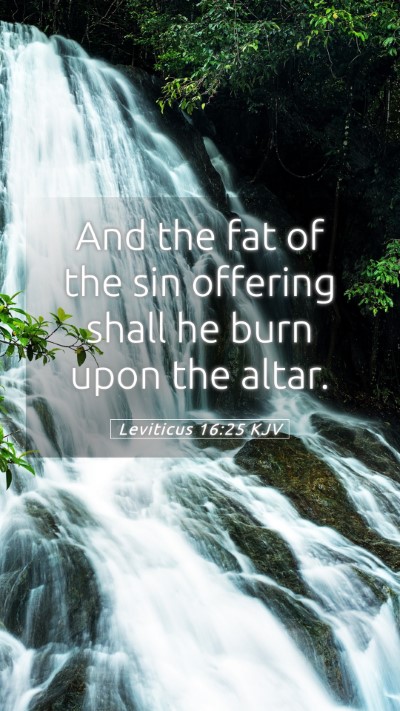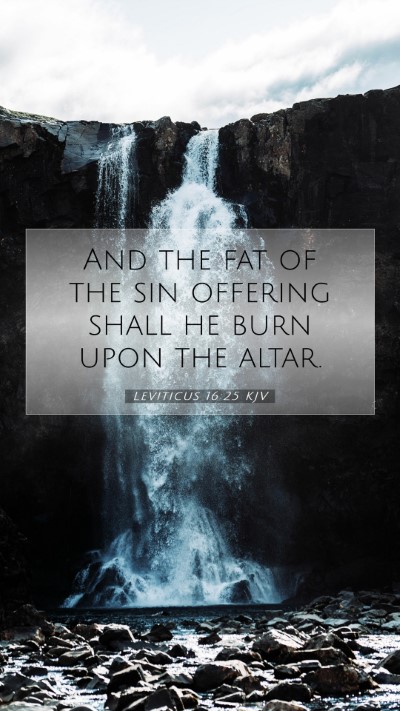Bible Verse Commentary: Leviticus 16:25
Verse: "And the fat of the sin offering shall be burnt upon the altar." - Leviticus 16:25
Understanding Leviticus 16:25
The verse appears within the context of the Day of Atonement, a significant event in the Jewish calendar where the sins of the people are symbolically transferred to a goat, and offerings are made to God. This passage emphasizes the ritualistic aspect of atonement, particularly focusing on the sacrificial system established in the Mosaic Law.
Commentary Insights
-
Matthew Henry's Commentary:
Henry notes that this verse marks the conclusion of the sin offering, directing that its fat should be burnt on the altar. The act symbolizes the complete dedication and surrender of the offering to God. It reflects the seriousness with which sin is regarded in the sacrificial system, where the fat—considered the richest part—represents the entirety of the offering consecrated to divine purposes.
-
Albert Barnes' Notes:
Barnes elaborates on the significance of the sin offering and the role of the fat in the sacrifice. He indicates that the fat represents abundance and is particularly pleasing to God, serving as a form of atonement for the nation's sins. The burning of the fat on the altar highlights God's desire for the purification of His people, emphasizing that genuine repentance involves a complete turning away from sin.
-
Adam Clarke's Commentary:
Clarke interprets the act of burning the fat as a representation of the acceptance of the offering by God. He notes that this specific ritual serves to remind the Israelites of their need for atonement and underscores the holiness of God. Clarke also suggests this act as a precursor to understanding the ultimate sacrifice made by Christ, who fulfills and transcends the Old Testament sacrificial system.
Theological Significance
Leviticus 16:25 is not merely a historical account; it serves as a theological foundation for understanding atonement, sacrifice, and the nature of sin in the biblical narrative. The verse teaches believers about the gravity of sin and the lengths to which God goes to restore fellowship with His people, pointing towards the future sacrifice of Jesus Christ as the ultimate sin offering.
Application to Daily Life
Understanding this verse encourages believers to reflect on their own lives concerning sin and repentance. Just as the Israelites presented their sin offerings to God, individuals today can approach God with a heart of repentance. The act of burning the fat symbolizes the need to offer our best to God, dedicating our lives to Him entirely as an act of worship and surrender.
Related Bible Cross References
- Leviticus 4:8-10 - Discusses the sin offering in detail.
- Hebrews 9:22 - Highlights the importance of blood for atonement.
- Isaiah 53:5 - Prophecy about the suffering servant as a sin offering.
Conclusion
In summary, Leviticus 16:25 encapsulates key aspects of atonement and sacrifice within the Old Testament framework. It invites deeper reflection on the seriousness of sin, the need for repentance, and the ultimate fulfillment of sacrificial atonement through Jesus. By studying such verses, believers gain insights into the overarching narrative of Scripture and its application in everyday life.
For those involved in Bible study groups or online Bible study, Leviticus 16:25 provides rich material for understanding the significance of biblical sacrifices and their implications for New Testament faith. Utilizing Bible study tools and Bible study resources can enhance the level of understanding and encourage meaningful discussions surrounding this verse and its broader implications.


